| Srl | Item |
| 1 |
ID:
084818
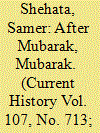

|
|
|
| 2 |
ID:
127452
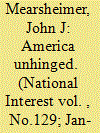

|
|
|
|
|
| Publication |
2014.
|
| Summary/Abstract |
SINCE EARLY 2011, political developments in Egypt and Syria have repeatedly captured the attention of the American foreign-policy elite. The Obama administration has tried to guide the turbulent political situation in post-Mubarak Egypt and become increasingly engaged in Syria's bloody civil war. The United States is already helping arm some of the forces fighting against the Assad regime, and President Obama came close to attacking Syria following its use of chemical weapons in August 2013. Washington is now directly involved in the effort to locate and destroy Syria's chemical-weapons stockpiles.
|
|
|
|
|
|
|
|
|
|
|
|
|
|
|
|
| 3 |
ID:
129869
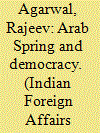

|
|
|
| 4 |
ID:
115057
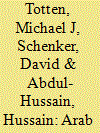

|
|
|
| 5 |
ID:
107213


|
|
|
| 6 |
ID:
116433
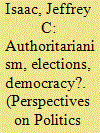

|
|
|
|
|
| Publication |
2012.
|
| Summary/Abstract |
The demand for democracy is a pervasive feature of contemporary political discourse. It is a compelling demand, for citizens and elites who rally beneath the banner of "democracy" and for political scientists who study the ways citizens and elites rally beneath banners in order to mobilize, seek, and contest political power. The force of this demand was captured by the cover of our June 2011 issue, which featured a wall in Egypt's Tahrir Square covered with graffiti stating that "Mubarak must go" and calling for "freedom" and "democracy."
|
|
|
|
|
|
|
|
|
|
|
|
|
|
|
|
| 7 |
ID:
106101
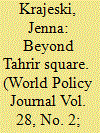

|
|
|
| 8 |
ID:
108410
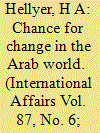

|
|
|
|
|
| Publication |
2011.
|
| Summary/Abstract |
As the largest Arab country, Egypt has always played a crucial role in the politics of the Arab world; however, the internal political dynamics of Egypt have until the January 2011 uprising hardly attracted a glance from international observers. This article gives an overview of the political arena and the various political forces at play in post-Mubarak Egypt. With many unpredictable variables currently at play in Egyptian politics, the result of the elections scheduled for November 2011 will likely surprise many, both within the country and beyond. The article also looks at what impact the political changes in Egypt may have had on the relationship between Egypt and Israel. There have been increasingly frequent demands within Egypt to revise the Camp David accords-but not at the expense of war with Israel. While Israel is unlikely to accept any calls to revise the peace treaty, Arab public opinion has become newly relevant for policy-makers and Israel will have to make corresponding adjustments to its regional security strategy.
|
|
|
|
|
|
|
|
|
|
|
|
|
|
|
|
| 9 |
ID:
027644
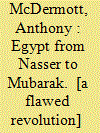

|
|
|
|
|
| Publication |
London, Croom Helm Ltd., 1988.
|
| Description |
311p.hbk
|
| Standard Number |
0709917368
|
|
|
|
|
|
|
|
|
|
|
|
Copies: C:1/I:0,R:0,Q:0
Circulation
| Accession# | Call# | Current Location | Status | Policy | Location |
| 030138 | 962.05/MCD 030138 | Main | On Shelf | General | |
|
|
|
|
| 10 |
ID:
120282
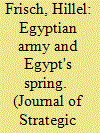

|
|
|
|
|
| Publication |
2013.
|
| Summary/Abstract |
After Mubarak's ouster, the Egyptian senior command had assumed a guardian role similar to the former Turkish model despite a shoddy performance in maintaining public order and the questionable loyalty of the lower ranked officers and the ordinary soldiers. Its relative success in managing the transition was due to the willingness of the Muslim Brotherhood and the Salafists to negotiate as stakeholders in the system rather than to battle in the streets against the Army. The Muslim Brotherhood strategy worked. In August 2012, recently elected president Morsi subordinated the military by removing the veteran Minister of Defence, the Chief-of-Staff, and other key officers. The military caved in without a whimper.
|
|
|
|
|
|
|
|
|
|
|
|
|
|
|
|
| 11 |
ID:
158084
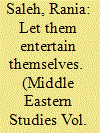

|
|
|
|
|
| Summary/Abstract |
This article examines the issues underlying the downfall of the Mubarak regime from the perspective of Egyptian cartoonists. A total of 2734 political cartoons published in five leading newspapers between January 2010 and February 2011 are analyzed. Because they form a significant part of the cultural context within which these cartoons are created, popular political jokes are also referenced. The study identifies political stagnation, domestic issues and corruption as the three most significant issues that paved the road to the fall of Mubarak.
|
|
|
|
|
|
|
|
|
|
|
|
|
|
|
|
| 12 |
ID:
108520
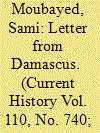

|
|
|
| 13 |
ID:
111931
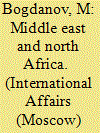

|
|
|
| 14 |
ID:
126234
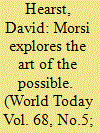

|
|
|
| 15 |
ID:
118615
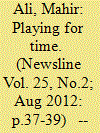

|
|
|
| 16 |
ID:
121492
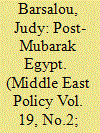

|
|
|
| 17 |
ID:
104231
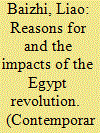

|
|
|
|
|
| Publication |
2011.
|
| Summary/Abstract |
After Tunisian President Ben Ali fled his country, Hosni Mubarak, Egypt's modern 'pharaoh' and ruler for 30 years, was toppled in just 18 days by a wave of popular protest. There are diverse reasons for his fall. These include economic problems caused by high population growth, high unemployment, and high inflation; social problems caused by the excessive gap between rich and poor; unfair distribution of social wealth; and political problems caused by Mubarak clinging to the presidency and his intention to hand over power to his own son. When the Tunisian revolution occurred, these were the reasons that triggered Mubarak's collapse. However, because Egypt is a regional power, the impacts of its own revolution far exceed those of Tunisia and will inevitably affect not just the region but also US strategy in the Middle East.
|
|
|
|
|
|
|
|
|
|
|
|
|
|
|
|
| 18 |
ID:
125165
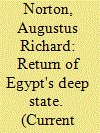

|
|
|
|
|
| Publication |
2013.
|
| Summary/Abstract |
Not only was the paramount role of the military unimpeded after the exit of Mubarak, but other key institutions were undiminished in their power.
|
|
|
|
|
|
|
|
|
|
|
|
|
|
|
|
| 19 |
ID:
124949
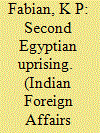

|
|
|
| 20 |
ID:
102599
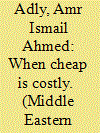

|
|
|
|
|
| Publication |
2011.
|
| Summary/Abstract |
It has been held that external rents significantly affect the formation of state institutional capacities as constant flows of rents tend to weaken the capacity to regulate, monitor and restructure the economy. This gives rise to the formulation of a question in reverse: would a steady and consistent decline in rents instigate state capacity building? This study argues that the impact of rent decline on capacity building is politically mediated by the institutional features of the ruling regime which determine the extent to which dwindling rents adversely affect the incumbents' chances of political survival. In Mubarak's Egypt, the ruling incumbents could survive with less rent by resorting to more repression and curtailing political participation and could thus evade the cost of state reform. In that setting, cheap regime survival proved to be quite costly for the overall economy.
|
|
|
|
|
|
|
|
|
|
|
|
|
|
|
|